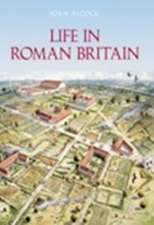Beyond the Monastery Walls: The Ascetic Revolution in Russian Orthodox Thought, 1814–1914
Autor Patrick Lally Michelsonen Limba Engleză Hardback – 10 iul 2017
During Russia's late imperial period, Orthodox churchmen, professionally trained theologians, and an array of social commentators sought to give meaning to Russian history and its supposed backwardness. Many found that meaning in asceticism. For some, ascetic religiosity prevented Russia from achieving its historical destiny. For others, it was the means by which the Russian people would realize the kingdom of God, thereby saving Holy Russia and the world from the satanic forces of the West.
Patrick Lally Michelson's intellectual history of asceticism in Russian Orthodox thought traces the development of these competing arguments from the early nineteenth century to the early months of World War I. He demonstrates that this discourse was an imaginative interpretation of lived Orthodoxy, primarily meant to satisfy the ideological needs of Russian thinkers and Orthodox intellectuals as they responded to the socioeconomic, political, and cultural challenges of modernity.
Patrick Lally Michelson's intellectual history of asceticism in Russian Orthodox thought traces the development of these competing arguments from the early nineteenth century to the early months of World War I. He demonstrates that this discourse was an imaginative interpretation of lived Orthodoxy, primarily meant to satisfy the ideological needs of Russian thinkers and Orthodox intellectuals as they responded to the socioeconomic, political, and cultural challenges of modernity.
Preț: 546.59 lei
Nou
Puncte Express: 820
Preț estimativ în valută:
104.59€ • 109.49$ • 86.54£
104.59€ • 109.49$ • 86.54£
Carte tipărită la comandă
Livrare economică 05-19 aprilie
Preluare comenzi: 021 569.72.76
Specificații
ISBN-13: 9780299312008
ISBN-10: 0299312003
Pagini: 320
Dimensiuni: 152 x 229 x 23 mm
Greutate: 0.59 kg
Editura: University of Wisconsin Press
Colecția University of Wisconsin Press
ISBN-10: 0299312003
Pagini: 320
Dimensiuni: 152 x 229 x 23 mm
Greutate: 0.59 kg
Editura: University of Wisconsin Press
Colecția University of Wisconsin Press
Recenzii
"Impressive in its analytical breadth and astute in its interpretive depth, this is an engaging, lucid, and original contribution to the history of modern Russian thought and modern Orthodoxy." —Vera Shevzov, Smith College
"Reading this extraordinary book is like having missing pieces of a puzzle click together at last. Actors normally examined separately—radical socialists, theological academies, hermits, great writers, bureaucrats, lay intellectuals—emerge as part of the same religious culture that placed asceticism at the center of discourse and practice in imperial Russia's defining century." —Nadieszda Kizenko, University at Albany, SUNY
"Michelson's groundbreaking study of discourses on asceticism makes a valuable contribution to the religious and intellectual history of both imperial Russia and Europe in the century prior to World War I."
—William Wagner, Williams College
—William Wagner, Williams College
Notă biografică
Patrick Lally Michelson is an associate professor of religious studies at Indiana University and the coeditor of Thinking Orthodox in Modern Russia.
Cuprins
Preface Introduction: Orthodox Asceticism and Narratives of Russian History 3 1 Histories of Monasticism, Philosophies of Religion: Asceticism Discourse in Russia and Europe, 1721–1856 2 Patristic Revival, Clerical Education: Asceticism Discourse in the Russian Church, 1814–1865 3 Ideologies of Asceticism: Philosophical Materialism and Academic Orthodoxy, 1855–1864 4 Orthodox Asceticism between Russian Nation and Christian Empire, 1865–1898 5 Asceticism Discourse in Revolution and War, 1892–1914 Epilogue: Asceticism's Afterlife in Emigration, "Civilization," and Scholarship Notes Index
Descriere
As the cultural and ideological foundations of imperial Russia were threatened by forces of modernity, an array of Orthodox churchmen, theologians, and lay thinkers turned to asceticism, hoping to ensure the coming Kingdom of God promised to the Russian nation.










